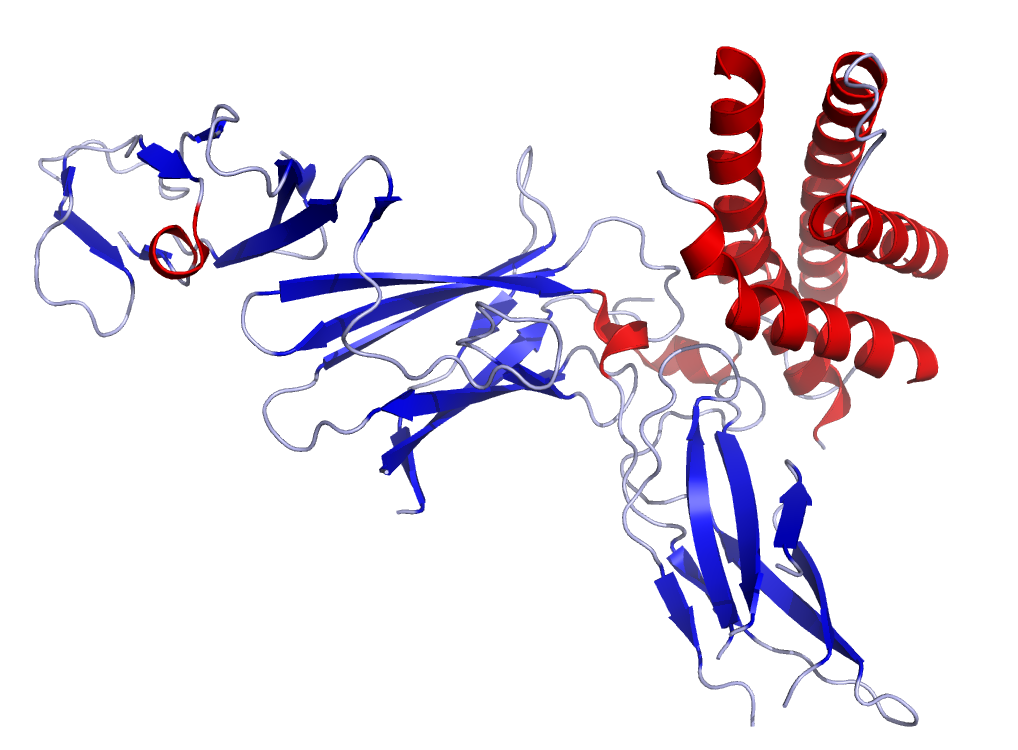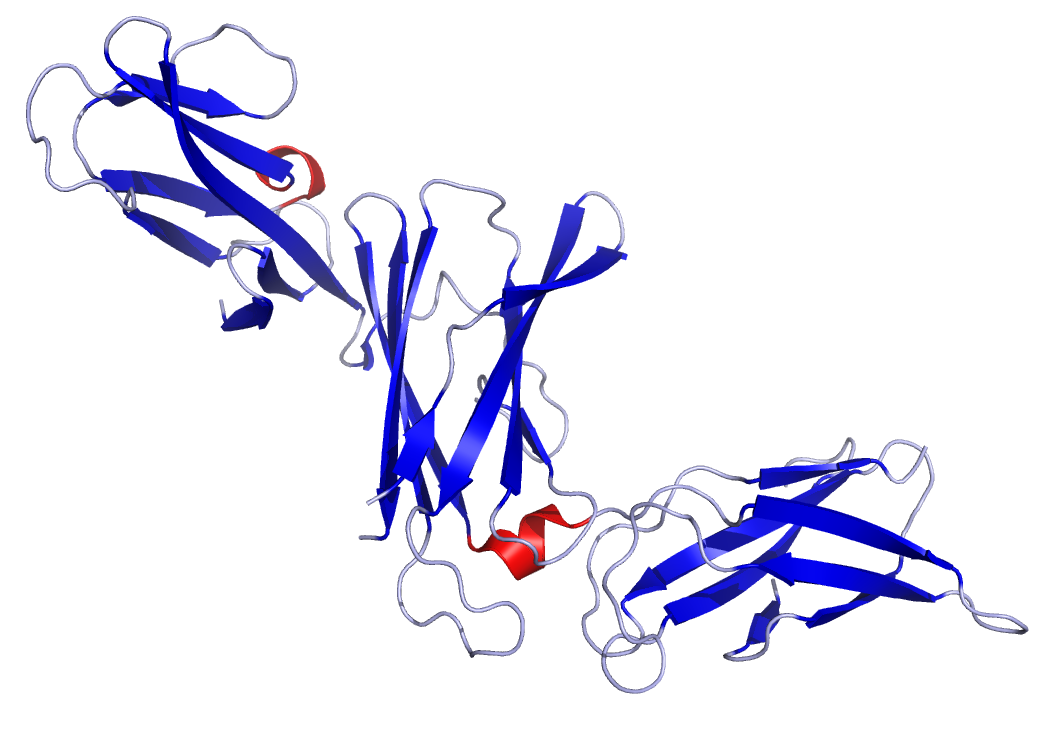Interleukin 12
| Human Interleukin 12 | |
|---|---|
 Crystal structure of human IL-12 | |
| Identifiers | |
| Symbol | IL12, p70 |
| PDB | 1F45 |
| IL12A | |
|---|---|
| Identifiers | |
| Symbol | IL12A |
| Alt. symbols | CLMF1, NKSF1, p35 |
| Entrez | 3592 |
| HUGO | 5969 |
| OMIM | 161560 |
| RefSeq | NM_000882 |
| UniProt | P29459 |
| Other data | |
| Locus | Chr. 3 p12-q13.2 |
| interleukin 12B | |
|---|---|
 Crystal structure of IL-12B | |
| Identifiers | |
| Symbol | IL12B |
| Alt. symbols | CLMF2, NKSF2, p40 |
| Entrez | 3593 |
| HUGO | 5970 |
| OMIM | 161561 |
| PDB | 1F42 |
| RefSeq | NM_002187 |
| UniProt | P29460 |
| Other data | |
| Locus | Chr. 5 q31.1-33.1 |
Interleukin 12 (IL-12) is an interleukin that is naturally produced by dendritic cells,[1] macrophages, neutrophils, and human B-lymphoblastoid cells (NC-37) in response to antigenic stimulation.
Gene and structure
IL-12 is composed of a bundle of four alpha helices. It is a heterodimeric cytokine encoded by two separate genes, IL-12A (p35) and IL-12B (p40). The active heterodimer (referred to as 'p70'), and a homodimer of p40 are formed following protein synthesis.
Functions
IL-12 is involved in the differentiation of naive T cells into Th1 cells.[2] It is known as a T cell-stimulating factor, which can stimulate the growth and function of T cells. It stimulates the production of interferon-gamma (IFN-γ) and tumor necrosis factor-alpha (TNF-α) from T cells and natural killer (NK) cells, and reduces IL-4 mediated suppression of IFN-γ. T cells that produce IL-12 have a coreceptor, CD30, which is associated with IL-12 activity.
IL-12 plays an important role in the activities of natural killer cells and T lymphocytes. IL-12 mediates enhancement of the cytotoxic activity of NK cells and CD8+ cytotoxic T lymphocytes. There also seems to be a link between IL-2 and the signal transduction of IL-12 in NK cells. IL-2 stimulates the expression of two IL-12 receptors, IL-12R-β1 and IL-12R-β2, maintaining the expression of a critical protein involved in IL-12 signaling in NK cells. Enhanced functional response is demonstrated by IFN-γ production and killing of target cells.
IL-12 also has anti-angiogenic activity, which means it can block the formation of new blood vessels. It does this by increasing production of interferon gamma, which in turn increases the production of a chemokine called inducible protein-10 (IP-10 or CXCL10). IP-10 then mediates this anti-angiogenic effect. Because of its ability to induce immune responses and its anti-angiogenic activity, there has been an interest in testing IL-12 as a possible anti-cancer drug. However, it has not been shown to have substantial activity in the tumors tested to this date. There is a link that may be useful in treatment between IL-12 and the diseases psoriasis & inflammatory bowel disease.
Signal transduction
IL-12 binds to the IL-12 receptor, which is a heterodimeric receptor formed by IL-12Rβ1 and IL-12Rβ2. IL-12Rβ2 is considered to play a key role in IL-12 function, since it is found on activated T cells and is stimulated by cytokines that promote Th1 cells development and inhibited by those that promote Th2 cells development. Upon binding, IL-12R-β2 becomes tyrosine phosphorylated and provides binding sites for kinases, Tyk2 and Jak2. These are important in activating critical transcription factor proteins such as STAT4 that are implicated in IL-12 signaling in T cells and NK cells. This pathway is known as the JAK-STAT pathway.[3]
An extensive review and visualization of IL-12 signaling can be found at the peer-reviewed pathway database Reactome: Interleukin-12 family
Autoimmunity
IL-12 is linked with autoimmunity. Administration of IL-12 to people suffering from autoimmune diseases was shown to worsen the autoimmune phenomena. This is believed to be due to its key role in induction of Th1 immune responses. In contrast, IL-12 gene knock-out in mice or a treatment of mice with IL-12 specific antibodies ameliorated the disease.
Results published in the Journal of Allergy and Clinical Immunology from a study where mice that were bred to be allergic to peanuts, interleukin-12 has been shown to not be present, suggesting that the molecule normally stops allergies to food developing. Further investigation is underway, to determine whether the results found in mice are as profound in humans.[4][5]
IL-12 and IL-12 receptor β1 mutations
Interleukin 12 (IL-12) is produced by activated antigen-presenting cells (dendritic cells, macrophages).[6] It promotes the development of Th1 responses and is a powerful inducer of IFNγ production by T and NK cells.[7]
A child with Bacillus Calmette–Guérin and Salmonella enteritidis infection was found to have a large homozygous deletion within the IL-12 p40 subunit gene, precluding expression of functional IL-12 p70 cytokine by activated dendritic cells and phagocytes. As a result, IFNγ production by the child's lymphocytes was markedly impaired.[8] This suggested that IL-12 is essential for protective immunity to intracellular bacteria such as mycobacteria and Salmonella.
Support is lent to this idea by the observation that a receptor for IL-12 is important for IFNγ production by lymphocytes. T and NK cells from seven unrelated patients who had severe idiopathic mycobacterial and Salmonella infections failed to produce IFNγ when stimulated with IL-12.[8] The patients were otherwise healthy. They were found to have mutations in the IL-12 receptor β1 chain, resulting in premature stop codons in the extracellular domain, resulting in unresponsiveness to this cytokine, again demonstrating IL-12's crucial role in host defense.
Defective Th1 and Th17 immune responses leading to chronic mucocutaneous candidiasis result from a mutation further downstream in the IL-12 signalling pathway. The trait was mapped to mutations in the STAT1 gene, which were associated with lower production of interferon-γ, IL-17, and IL-22 in response to IL-12 or IL-23 receptor associated Jak2 and Tyk2 activity.[9]
See also
References
- ↑ Kaliński P, Hilkens CM, Snijders A, Snijdewint FG, Kapsenberg ML (1997). "IL-12-deficient dendritic cells, generated in the presence of prostaglandin E2, promote type 2 cytokine production in maturing human naive T helper cells". J. Immunol. 159 (1): 28–35. PMID 9200435.
- ↑ Hsieh CS, Macatonia SE, Tripp CS, Wolf SF, O'Garra A, Murphy KM (April 1993). "Development of TH1 CD4+ T cells through IL-12 produced by Listeria-induced macrophages". Science. 260 (5107): 547–9. doi:10.1126/science.8097338. PMID 8097338.
- ↑ Wang KS, Frank DA, Ritz J (May 2000). "Interleukin-2 enhances the response of natural killer cells to interleukin-12 through up-regulation of the interleukin-12 receptor and STAT4". Blood. 95 (10): 3183–90. PMID 10807786.
- ↑ Temblay JN, Bertelli E, Arques JL, Regoli M, Nicoletti C (September 2007). "Production of IL-12 by Peyer patch-dendritic cells is critical for the resistance to food allergy". J. Allergy Clin. Immunol. 120 (3): 659–65. doi:10.1016/j.jaci.2007.04.044. PMID 17599398.
- ↑ "Food allergy molecule discovered". BBC News. 1 July 2007.
- ↑ Dorman SE, Holland SM (2000). "Interferon-gamma and interleukin-12 pathway defects and human disease". Cytokine Growth Factor Rev. 11 (4): 321–33. doi:10.1016/s1359-6101(00)00010-1. PMID 10959079.
- ↑ Newport MJ, Holland SM, Levin M, Casanova JL (2007). "Inherited disorders of the interleukin-12/23-interferon gamma axis". In Ochs HD, Smith CI, Puck J. Primary immunodeficiency diseases : a molecular and genetic approach. New York: Oxford University Press. pp. 390–401. ISBN 0-19-514774-X.
- ↑ Jump up to: 8.0 8.1 Altare F, Durandy A, Lammas D, Emile JF, Lamhamedi S, Le Deist F, Drysdale P, Jouanguy E, Döffinger R, Bernaudin F, Jeppsson O, Gollob JA, Meinl E, Segal AW, Fischer A, Kumararatne D, Casanova JL (1998). "Impairment of mycobacterial immunity in human interleukin-12 receptor deficiency". Science. 280 (5368): 1432–5. doi:10.1126/science.280.5368.1432. PMID 9603732.
- ↑ van de Veerdonk FL, Plantinga TS, Hoischen A, Smeekens SP, Joosten LA, Gilissen C, Arts P, Rosentul DC, Carmichael AJ, Smits-van der Graaf CA, Kullberg BJ, van der Meer JW, Lilic D, Veltman JA, Netea MG (2011). "STAT1 mutations in autosomal dominant chronic mucocutaneous candidiasis". N. Engl. J. Med. 365 (1): 54–61. doi:10.1056/NEJMoa1100102. PMID 21714643.
Further reading
- Guenova E, Volz T, Sauer K, Kaesler S, Müller MR, Wölbing F, Chen K, Schwärzler C, Brossart P, Röcken M, Biedermann T (2008). "IL-4-mediated fine tuning of IL-12p70 production by human DC". Eur. J. Immunol. 38 (11): 3138–49. doi:10.1002/eji.200838463. PMID 18924208.